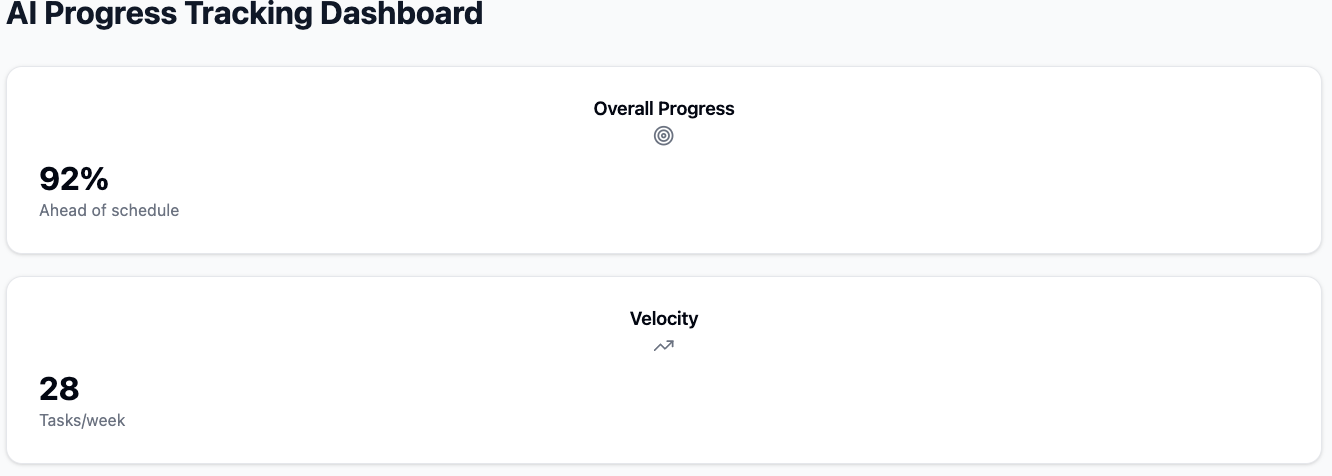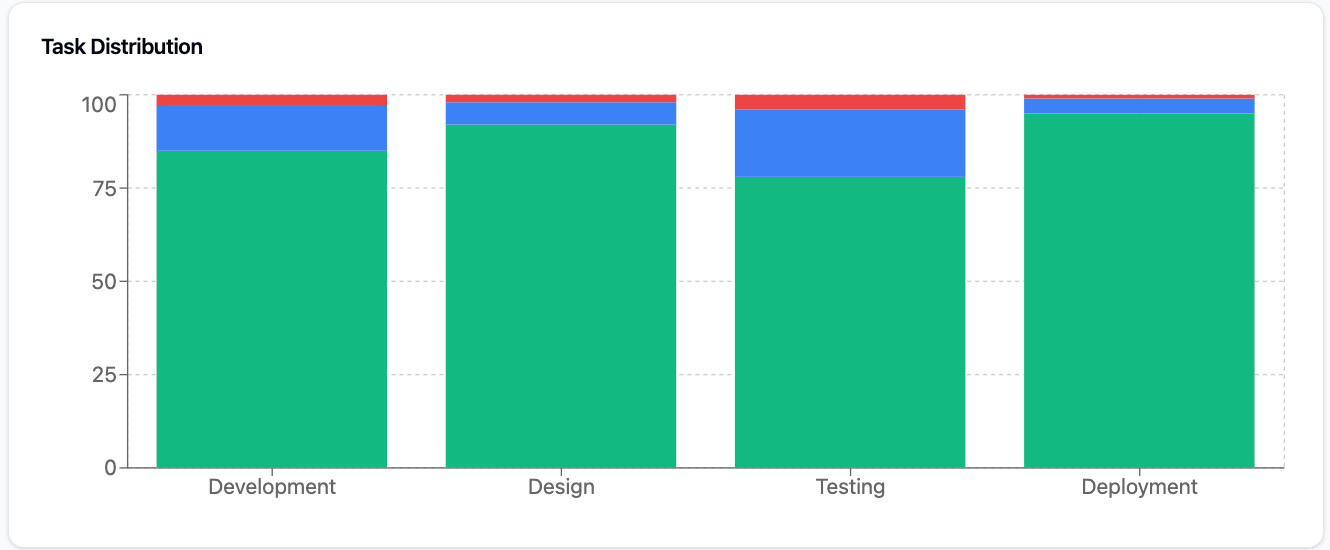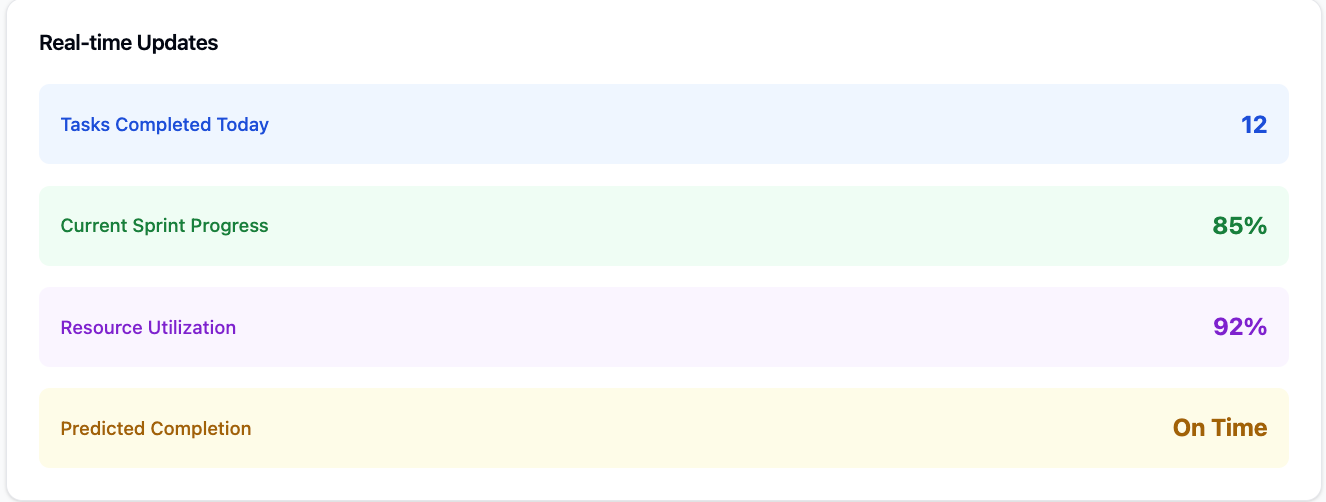Top 10 Tools to Stay on Track with AI Driven Progress Tracking Tools
Stay On Track With AI-Driven Progress Tracking Tools: Project Management Evolved
As projects get more complex, artificial intelligence is changing how we track and manage progress. AI-driven progress tracking tools are the new foundation of modern project management. Let’s dive into how these tools are changing the landscape of monitoring and delivery.
Introduction to AI-Driven Project Management
In the ever-evolving landscape of project management, AI-driven approaches are revolutionizing how we manage tasks and workflows. By leveraging artificial intelligence, project managers can optimize task management processes, streamline project workflows, and enhance decision-making. AI’s ability to automate repetitive tasks, predict potential risks, and provide valuable insights into project data empowers project managers to make data-driven decisions and prioritize tasks effectively. This not only ensures successful project completion but also enhances overall efficiency and productivity. As AI continues to advance, its role in project management will only become more integral, offering new ways to tackle complex challenges and drive project success.

Benefits of AI in Project Management
The integration of AI in project management brings a multitude of benefits that can significantly enhance the way projects are managed. AI-powered project management tools offer several key advantages:
-
Optimize Task Management Processes: By automating routine tasks and streamlining workflows, AI helps project managers focus on more strategic activities. This leads to more efficient task management processes and reduces the time spent on manual tasks.
-
Enhance Decision-Making: AI provides predictive analytics and real-time insights into project data, enabling project managers to make informed decisions quickly. This data-driven approach helps in identifying potential issues early and taking corrective actions.
-
Improve Collaboration and Communication: AI-driven task scheduling and assignment features facilitate better collaboration among team members. These tools ensure that everyone is on the same page, reducing misunderstandings and improving overall team efficiency.
-
Reduce Human Error: By automating data analysis and reporting, AI minimizes the risk of human error. This leads to more accurate project tracking and reporting, ensuring that project managers have reliable information at their fingertips.
-
Increase Productivity and Efficiency: Simplifying task management and reducing the need for manual data entry allows project managers to focus on high-value activities. This boosts overall productivity and ensures that projects are completed on time and within budget.
Progress Tracking Evolved
AI Project Management Tools Automation Precision
AI has revolutionized data collection and analysis, virtually eliminating human error in progress tracking. By automatically gathering and processing info from multiple sources, these tools ensure project stakeholders always have access to accurate info. This precision goes beyond simple metrics to complex forecasting and trend analysis.

Real-Time Intelligence
No more waiting for weekly status reports. AI-powered tracking tools give you instant visibility into project progress so you can make informed decisions as situations unfold. This real-time capability is especially valuable in fast-paced industries where quick reaction can mean the difference between success and failure. These tools also support collaborative task management, allowing team members to work together seamlessly and stay updated in real-time.
Predictive Power
One of the most powerful things about AI-driven tracking tools is their ability to predict potential issues before they become problems. By analyzing project data patterns and trends, these systems can identify potential bottlenecks, resource constraints or delays early enough for the team to take preventive action. By predicting potential issues, these tools simplify task management, making it easier for teams to stay on track and meet deadlines.
Resource Optimization
AI doesn’t just track progress, it optimizes it. These systems analyze resource allocation, workload distribution and task dependencies to suggest the most efficient use of resources. This means teams operate at peak performance while avoiding burnout and unnecessary costs.

AI-Powered Project Management Tools
The market is flooded with AI-powered project management tools, each offering unique features to help manage tasks and projects more efficiently. Here are some of the most popular AI project management tools:
-
ClickUp: A comprehensive project management tool that offers AI-driven task management, project scheduling, and team collaboration features. ClickUp’s AI capabilities help in automating repetitive tasks and optimizing workflows, making it easier for project managers to track project progress and manage tasks effectively.
-
Forecast: This project management tool uses AI to predict project outcomes, identify potential risks, and optimize resource allocation. Forecast’s AI-driven insights enable project managers to make data-driven decisions and ensure that resources are used efficiently.
-
Wrike: A robust project management platform that leverages AI to automate task management, project scheduling, and team collaboration. Wrike’s AI features help in simplifying task management processes and improving overall project efficiency.
Practical Applications Across Industries
Construction Site Monitoring
In construction, AI-powered systems are revolutionizing progress tracking through video capture and machine learning. These tools monitor on-site activities in real time, tracking everything from worker safety compliance to construction progress against plans. This has improved project oversight and reduced the need for constant physical site visits.
Using a task management tool, project managers can efficiently monitor and manage construction activities, ensuring timely project completion.
Manufacturing
ManufacturingAI tracking tools are now an essential part of modern manufacturing operations. By monitoring production rates, machine performance and quality metrics in real-time, these systems help optimize manufacturing processes and prevent downtime. Being able to detect and respond to anomalies in real time has led to significant improvements in operational efficiency.
Cross Platform Integration
Modern AI tracking tools are great at integrating data from multiple sources, including IoT sensors, project management software, and communication platforms. This integration gives you a view of project progress that would be impossible to achieve manually.
AI in Project Risk Management
AI plays a pivotal role in project risk management by identifying potential risks, predicting their likelihood and impact, and providing recommendations for mitigation. AI-powered project management tools assist project managers in several ways:
-
Identify Potential Risks: By analyzing historical data and predicting trends, AI can identify potential risks early in the project lifecycle. This proactive approach allows project managers to address issues before they escalate.
-
Assess Likelihood and Impact: Using machine learning algorithms, AI can assess the likelihood and impact of identified risks. This helps project managers prioritize risks and focus on the most critical ones.
-
Develop Mitigation Strategies: AI analyzes data and provides recommendations for risk mitigation. These insights help project managers develop effective strategies to minimize the impact of risks on the project.
-
Monitor and Review Risk Management Plans: AI-powered tools track project progress and identify areas for improvement in risk management plans. This continuous monitoring ensures that risk management strategies remain effective throughout the project lifecycle.
By integrating AI into project risk management, project managers can enhance their ability to foresee and mitigate risks, ensuring smoother project execution and higher chances of success.
Implementation Tips
To get the most out of AI-driven progress tracking tools you should:
- Start with Clear Objectives
-
Define specific goals and metrics for progress tracking
-
Identify key performance indicators that align with project success criteria
-
Choose the right AI task management tool that aligns with your project goals and objectives
- Ensure Data Quality
-
Implement robust data collection processes
-
Validate data sources and integration points
-
Maintain consistent data standards across platforms
- Foster Team Adoption
-
Provide comprehensive training on AI tools
-
Show team members the benefits
-
Establish protocols for using tracking insights
- Monitor and Adjust
-
Regularly review system performance
-
Gather feedback from users
-
Adjust configurations to optimize
The Future of Track Project Progress
As AI technology advances, we will see even more sophisticated progress tracking. Future trends include:
-
Better natural language processing for more intuitive interface with tracking systems
-
Deeper pattern recognition for more accurate project prediction
-
Deeper integration with other business systems for project intelligence
-
Improved visualization tools for complex project data
-
Enhanced task prioritization features that intelligently adjust based on real-time data and project needs
Conclusion
AI-driven progress tracking tools are a game changer in project management. Their ability to give you accurate real-time insights while automating routine tasks and predicting potential issues makes them essential for modern organizations. As these tools evolve, they will play an increasingly critical role in project success across all industries. Task manager apps are essential for modern organizations to stay competitive and deliver projects efficiently.
The key is to choose the right tools and implement them well. Organizations that do will be well positioned to deliver projects consistently and efficiently in a competitive world.